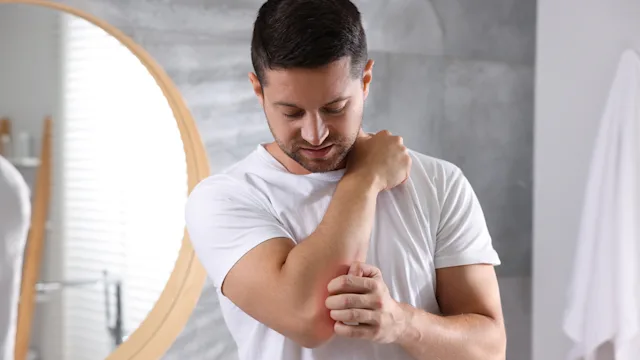Key takeaways:
Leg itchiness during exercise is often a normal response to activity or “runner’s itch.” In some cases, it may be due to an underlying medical condition.
In most cases, you can treat itchy legs from exercise and don’t have to stop working out. A healthcare professional can help develop a treatment plan for you so you can still enjoy the benefits of regular exercise.
Exercise-induced urticaria is a serious condition that can lead to anaphylaxis — a deadly allergic reaction — if left untreated. If you have itching, hives, and shortness of breath with exercise, get medical care immediately.
If you get itchy legs during or after exercise, you may be wondering what’s causing your symptoms and if it’s something to be concerned about. You may even be tempted to stop working out. But this could cause you to miss out on the many health benefits of exercise.
The good news is that for many people, leg itching may be a normal response to exercise. But in some cases, itching legs during or after exercise may be due to an underlying medical condition.
Let’s take a closer look at why you feel the sensation of your legs itching during exercise and how you can stop it from happening.
Search and compare options
Is it normal to have itchy legs when exercising?
Leg itching during exercise, or “runner’s itch,” may be normal for many people. It happens because the body releases histamine as a normal response to exercise. Histamine helps the blood vessels to dilate, so there’s better circulation in the muscles and capillaries. This seems to be a protective effect against muscle fatigue.
Histamine also plays a role in how the body responds to allergies. That’s why you may have symptoms similar to an allergic reaction — like itchy legs — when it’s released during exercise.
In rare cases, runner’s itch may be a first symptom of an underlying medical condition.
What medical conditions can cause itchy legs during exercise?
Sometimes itchy legs during or after exercise is more than just runner’s itch. Here are some medical conditions that can cause itchy legs with exercise.
Exercise-induced urticaria
Exercise-induced urticaria is a condition that could be described as an allergic reaction to exercise. People with this condition develop allergic symptoms about 30 minutes after starting exercise. Symptoms can include:
Itchy skin
Rash
Flushing
Hives
Allergic to exercise? Learn more about why some people with exercise-induced urticaria have allergic reactions after exercise.
Skin breakouts from the heat: Here are some of the best treatments for heat rash.
Asthma and exercise: Find out more about the cause and treatment for exercise-induced asthma.
In severe cases, exercise-induced urticaria could be complicated with anaphylaxis (severe allergic reaction). This is a rare complication, but it’s a medical emergency and can be life-threatening.
People with exercise-induced urticaria should always carry an adrenaline auto-injector (EpiPen) to use in case of anaphylaxis. It’s also a good idea to exercise with others who are aware and can assist in an emergency.
Food-dependent exercise-induced allergies
Some people get allergic reactions and itching after eating specific foods and then exercising. This is like exercise-induced urticaria but triggered by food and can also progress to anaphylaxis. In these cases, food or exercise alone wouldn’t cause the symptoms — it’s the combination that causes the itching.
Read more like this
Explore these related articles, suggested for readers like you.
Some common food triggers that can cause exercise-related itching include:
Wheat
Seafood
Red meat
Eggs
Peanuts
People with food-dependent exercise-induced allergies can usually maintain regular exercise. But it’s important to avoid the food triggers several hours before and after exercise. And if symptoms are severe, they shouldn’t eat those foods at all.
Medication-dependent exercise-induced allergies
Some medications may trigger an allergic reaction during exercise. The most common medication triggers are:
Nonsteroidal anti-inflammatory drugs (NSAIDs)
Aspirin
Certain antibiotics (like cephalosporins)
If you’re preparing for long runs or races, talk with a healthcare professional about whether you should avoid using these medications.
Exercise-induced vasculitis
People with exercise-induced vasculitis (inflammation in blood vessels) get itching, pain, burning, and skin lesions in the lower legs after prolonged exercise. This usually occurs in hot weather. Fortunately, this condition usually resolves on its own. Supportive treatment for symptoms could include:
Topical steroids
Elevating the legs
Wearing light, loose clothing during exercise
Exercise-induced vasculitis will often prompt a healthcare professional to look for underlying autoimmune conditions as well.
Contact dermatitis
Contact dermatitis can cause itchy legs with exercise. The skin may get inflamed while running due to direct contact with irritants in the environment. Skin inflammation may result from sweating and friction with:
Clothes
Shoes
Socks
Athletic tape
Dry skin
Excessively dry skin can lead to leg itching with exercise. The skin may get scaly and cracked from exposure to the sun or heat during workouts. A damaged skin barrier may cause an itching sensation with exercise.
Antihistamines and emollients (like Vaseline or Aquaphor) can be helpful in treating dry skin.
Venous insufficiency
People with venous insufficiency (impaired blood flow in their leg veins) may get itchy legs with exercise that usually improves with rest. Other leg symptoms of venous insufficiency include:
Fatigue
Swelling
Pain
Venous insufficiency can also lead to dry skin, which adds to the itchy sensation.
How do you treat runner’s itch?
Fortunately, runner’s itch has a simple remedy. It’s usually treated with over-the-counter (OTC) antihistamines to reduce the effect of the histamine release during exercise.
According to Dr. Leonardo Oliveira, FACP, FACSM, sports and exercise medicine physician at Cleveland Clinic Florida, cetirizine appears to have the best response to exercise. And it doesn’t tend to cause heavy drowsiness like many other allergy medications.
How do you prevent itchiness when you’re exercising?
It’s best to know what’s causing your itchiness to know how to prevent it. In general, here are some tips that may help prevent itchiness when you’re exercising:
Try taking an OTC antihistamine (talk with a healthcare professional first to make sure it’s safe for you).
Limit your sun exposure while exercising.
Identify any possible triggers and avoid them.
Avoid tight clothing that may rub against your skin or cause friction.
Wear breathable clothing that allows sweat to evaporate easily.
Should you get medical care for itchy legs from exercise?
Always talk with a healthcare professional if you have a health concern. But if the leg itching is not accompanied by other symptoms and resolves on its own, it’s likely a runner’s itch and you can try OTC treatments first.
Let a healthcare professional know if the itching:
Affects other parts of your body
Doesn’t improve with rest
Persists or gets worse with every exercise session
Occurs with leg swelling, skin lesions, shortness of breath, wheezing, dizziness, intense abdominal pain or vomiting
If you’re not sure what’s causing your itchy legs with exercise it’s a good idea to figure out if there are any triggers causing your symptoms. Oliveira advises that you check “the timing of symptoms in relation to medication and food ingestion.” This will help you and your primary care provider figure out why you have itching and develop a treatment plan.
If you think you have a more serious condition like exercise-induced urticaria, talk with a healthcare professional first before exercising again. Your healthcare team will give you guidance on next steps you should take.
Frequently asked questions
Some vitamin deficiencies can cause an itchy rash or dry skin. Vitamin deficiencies that cause skin changes include:
Vitamin A
B vitamins (B2, B3, B6, B7, B12)
Vitamin C
Vitamin D
Abnormal blood glucose levels from diabetes may cause skin changes and itchiness in your legs. If you’re concerned about your risk for diabetes, consult a healthcare professional.
Yes, sweat can make you itch. If too much sweat remains on the skin surface for a long time, it may block the sweat pores. This can irritate the skin and cause itching.
Some vitamin deficiencies can cause an itchy rash or dry skin. Vitamin deficiencies that cause skin changes include:
Vitamin A
B vitamins (B2, B3, B6, B7, B12)
Vitamin C
Vitamin D
Abnormal blood glucose levels from diabetes may cause skin changes and itchiness in your legs. If you’re concerned about your risk for diabetes, consult a healthcare professional.
Yes, sweat can make you itch. If too much sweat remains on the skin surface for a long time, it may block the sweat pores. This can irritate the skin and cause itching.
The bottom line
Getting itchy legs during exercise can be bothersome, but in general it shouldn’t be a cause to stop exercising. Fortunately, it’s usually just “runner’s itch” and you can ease the discomfort with treatments like OTC antihistamines. You may need to reach out to a healthcare professional to look for other causes if the itching persists, gets worse, or comes with other symptoms.

Why trust our experts?


References
American Academy of Allergy, Asthma & Immunology. (2018). Epinephrine auto-injector.
Aşkın, Ö., et al. (2021). Vitamin deficiencies/hypervitaminosis and the skin. Clinics in Dermatology.
Christensen, M. J., et al. (2019). Exercise-induced anaphylaxis: causes, consequences, and management recommendations. Expert Review of Clinical Immunology.
Emer, J., et al. (2015). Sports dermatology: Part 1 of 2 traumatic or mechanical injuries, inflammatory conditions, and exacerbations of pre-existing conditions. Journal of Clinical and Aesthetic Dermatology.
Espitia, O., et al. (2016). Exercise-induced vasculitis: A review with illustrated cases. American Journal of Clinical Dermatology.
Geller, M. (2016). Diagnostic and therapeutic approach in patients with exercise-induced anaphylaxis. Current Treatment Options in Allergy.
Jud, P., et al. (2018). Exercise-induced vasculitis. Canadian Medical Association Journal.
Luttrell, M. J., et al. (2017). The intriguing role of histamine in exercise responses. Exercise and Sports Science Reviews.
Moniaga, T. S., et al. (2020). Mechanisms and management of itch in dry skin. Acta Dermato-Venereologica.
Murota, H., et al. (2019). Why does sweat lead to the development of itch in atopic dermatitis? Experimental Dermatology.
Niijima-Yaoita, F., et al. (2012). Roles of histamine in exercise-induced fatigue: Favouring endurance and protecting against exhaustion. Biological & Pharmaceutical Bulletin.
Patel, S. K., et al. (2024). Venous insufficiency. StatPearls.
Srisuwatchari, W., et al. (2023). Food-dependent exercise-induced anaphylaxis: A distinct form of food allergy — an updated review of diagnostic approaches and treatments. Foods.


















